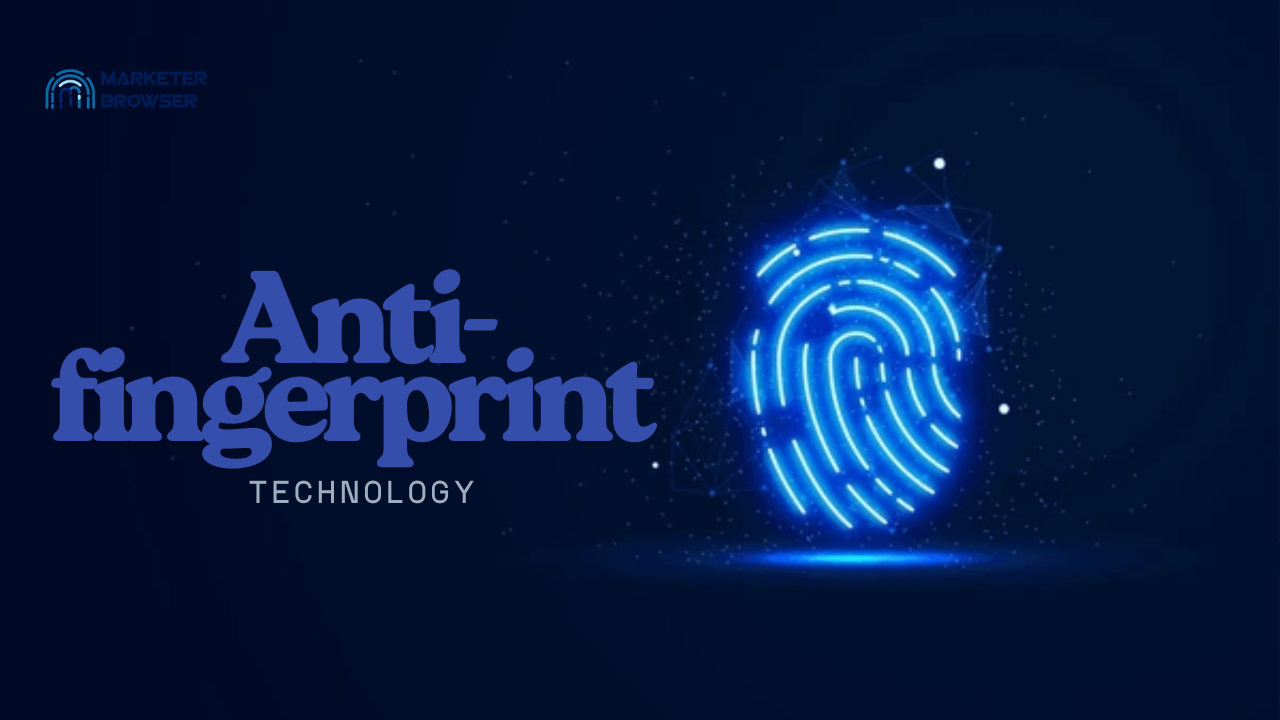Are You Really Anonymous Online? The Truth About Digital Fingerprints
Many people believe that by turning on a VPN, using a proxy, or opening Incognito mode, they can hide their identity online. Unfortunately, that’s far from the truth. What most users overlook is something far more revealing: digital fingerprints.
In this article, we’ll dive into what digital fingerprints are, how they compromise your online anonymity, why VPNs and proxies are no longer enough, and how fingerprint browsers like MarketerBrowser are becoming the go-to solution for marketers, e-commerce sellers, and anyone managing multiple accounts in 2025.

What Exactly Is a Digital Fingerprint?
Every time you visit a website, your browser automatically shares technical details about your device and software. When combined, these details form a digital fingerprint that is often unique to you.
Some of the most common fingerprinting data points include:
Browser type and version
Installed plugins and fonts
Screen resolution and color depth
Operating system and hardware specs
Device memory and graphics card
Language, time zone, and system settings
Think of it as your device’s “DNA.” Even if you mask your IP address with a VPN, your digital fingerprint remains the same. Websites and platforms use this to track you across sessions, recognize repeat visitors, and—most importantly—detect suspicious patterns when you’re running multiple accounts.
Why VPNs and Proxies Are No Longer Enough
For a long time, VPNs and proxies were considered the gold standard for anonymity. But platforms like Facebook, Instagram, TikTok, Amazon, and Google Ads have invested heavily in anti-fraud and anti-spam detection.
Here’s why VPNs and proxies alone can’t protect you:
VPNs hide your IP but not your identity. Your fingerprint data doesn’t change, so accounts linked to the same fingerprint are still connected.
Proxies provide new IPs but reuse fingerprints. If multiple accounts share the same environment, they are easily flagged as “fake.”
Incognito or private browsing doesn’t erase fingerprints. It only hides browsing history locally, but websites still collect your full fingerprint.
Modern platforms analyze patterns. Repeated logins from mismatched IPs and fingerprints quickly raise red flags.
This explains why so many people running multiple accounts get frustrated when accounts keep getting suspended—even though they’re using VPNs and proxies.
What Is a Fingerprint Browser and How Does It Work?
A fingerprint browser (also called an anti-detect browser) is a specialized tool designed to counter digital fingerprinting. Instead of exposing your real device setup, it creates unique, randomized browser profiles that look like genuine users.
Here’s what a fingerprint browser like MarketerBrowser can do:
Custom browser environments: Each account runs in a separate profile with unique fingerprints.
Proxy integration: Easily bind proxies to each profile, so IP and fingerprint data align.
Randomized identities: Every profile mimics a real user with unique time zones, languages, and system data.
Multi-account safety: Profiles are isolated, preventing cross-contamination or accidental linking.
The result? To platforms, your accounts look like they’re being operated by different real people on separate devices—not one person behind multiple accounts.
Why Marketers Are Choosing MarketerBrowser
While there are several fingerprint browsers available, MarketerBrowser has gained popularity among digital marketers, agencies, and e-commerce sellers because it balances security, usability, and scalability.
Some of its standout advantages include:
Easy setup – No technical background required.
Scalable management – Handle 10, 100, or even 1,000 accounts from one dashboard.
Anti-detection technology – Fingerprints are randomized and realistic, reducing bans.
Organized workflow – Profiles can be grouped and labeled for campaigns.
Reliable performance – Stable environments that behave like real user sessions.
For anyone doing affiliate marketing, running ad accounts, managing social media, or operating e-commerce stores, MarketerBrowser provides a professional-grade solution that VPNs and Incognito mode simply can’t match.
Use Cases of Fingerprint Browsers in 2025
Fingerprint browsers are no longer niche tools—they are essential for many online activities:
Social media marketing: Safely operate multiple Facebook, Instagram, TikTok, or Twitter accounts.
E-commerce & dropshipping: Run multiple Amazon, eBay, or Shopify accounts without linking.
Advertising & affiliate marketing: Manage ad accounts on Google Ads, Meta, or TikTok Ads with reduced suspension risk.
Freelancers & agencies: Offer clients dedicated, isolated accounts while protecting both parties.
In short, if your business relies on multiple accounts, a fingerprint browser is now a must-have.
Why MarketerBrowser Is the Future of Online Privacy
Digital anonymity is no longer about just hiding your IP address. The new battlefield is fingerprinting detection, and platforms are constantly evolving.
MarketerBrowser’s advanced anti-detect technology ensures you stay one step ahead. It doesn’t just hide your identity—it creates believable digital personas that allow you to work confidently without triggering alarms.
Conclusion
So, are you really anonymous online? If you’re only relying on VPNs, proxies, or Incognito mode, the answer is no. Digital fingerprints expose far more than most people realize.
That’s why marketers, entrepreneurs, and professionals worldwide are switching to smarter tools. With MarketerBrowser, you can:
Protect your digital identity
Run multiple accounts without bans
Stay competitive in an increasingly strict online environment
👉 The future of online privacy is not just about hiding—it’s about blending in. And that’s exactly what MarketerBrowser helps you achieve.


